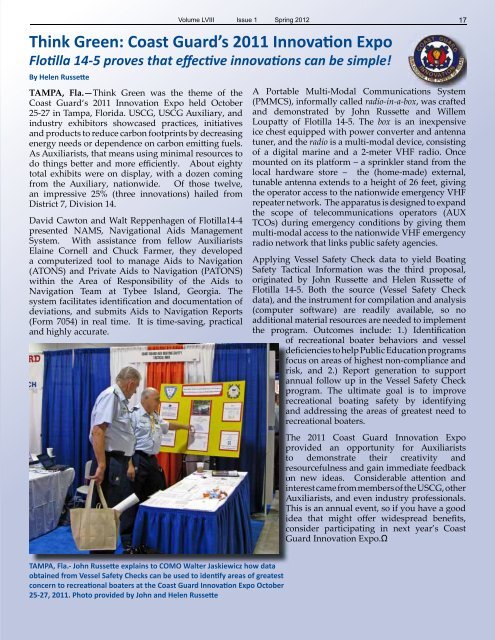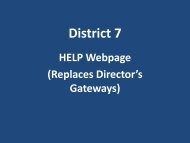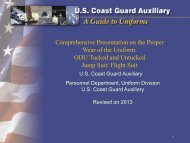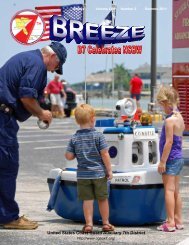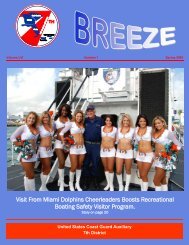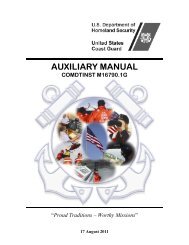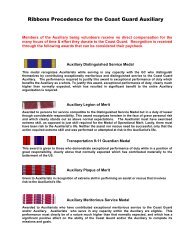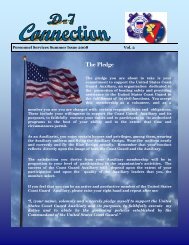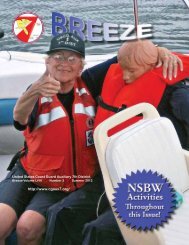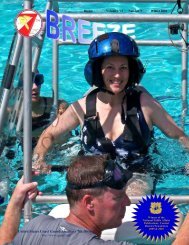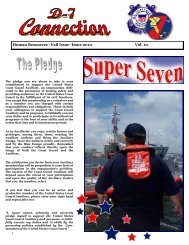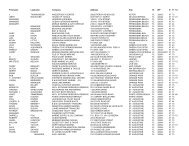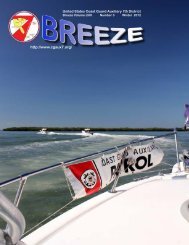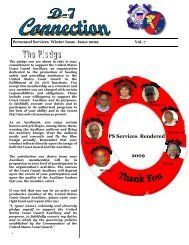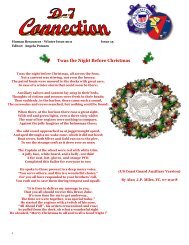United States Coast Guard Auxiliary 7th District Breeze - USCGAUX ...
United States Coast Guard Auxiliary 7th District Breeze - USCGAUX ...
United States Coast Guard Auxiliary 7th District Breeze - USCGAUX ...
Create successful ePaper yourself
Turn your PDF publications into a flip-book with our unique Google optimized e-Paper software.
TAMPA, Fla.—Think Green was the theme of the<br />
<strong>Coast</strong> <strong>Guard</strong>‘s 2011 Innovation Expo held October<br />
25-27 in Tampa, Florida. USCG, USCG <strong>Auxiliary</strong>, and<br />
industry exhibitors showcased practices, initiatives<br />
and products to reduce carbon footprints by decreasing<br />
energy needs or dependence on carbon emitting fuels.<br />
As Auxiliarists, that means using minimal resources to<br />
do things better and more efficiently. About eighty<br />
total exhibits were on display, with a dozen coming<br />
from the <strong>Auxiliary</strong>, nationwide. Of those twelve,<br />
an impressive 25% (three innovations) hailed from<br />
<strong>District</strong> 7, Division 14.<br />
David Cawton and Walt Reppenhagen of Flotilla14-4<br />
presented NAMS, Navigational Aids Management<br />
System. With assistance from fellow Auxiliarists<br />
Elaine Cornell and Chuck Farmer, they developed<br />
a computerized tool to manage Aids to Navigation<br />
(ATONS) and Private Aids to Navigation (PATONS)<br />
within the Area of Responsibility of the Aids to<br />
Navigation Team at Tybee Island, Georgia. The<br />
system facilitates identification and documentation of<br />
deviations, and submits Aids to Navigation Reports<br />
(Form 7054) in real time. It is time-saving, practical<br />
and highly accurate.<br />
Volume LVIII Issue 1 Spring 2012 17<br />
Think Green: <strong>Coast</strong> <strong>Guard</strong>’s 2011 Innovaon Expo<br />
Flolla 14-5 proves that effecve innovaons can be simple!<br />
By Helen Russee<br />
A Portable Multi-Modal Communications System<br />
(PMMCS), informally called radio-in-a-box, was crafted<br />
and demonstrated by John Russette and Willem<br />
Loupatty of Flotilla 14-5. The box is an inexpensive<br />
ice chest equipped with power converter and antenna<br />
tuner, and the radio is a multi-modal device, consisting<br />
of a digital marine and a 2-meter VHF radio. Once<br />
mounted on its platform – a sprinkler stand from the<br />
local hardware store – the (home-made) external,<br />
tunable antenna extends to a height of 26 feet, giving<br />
the operator access to the nationwide emergency VHF<br />
repeater network. The apparatus is designed to expand<br />
the scope of telecommunications operators (AUX<br />
TCOs) during emergency conditions by giving them<br />
multi-modal access to the nationwide VHF emergency<br />
radio network that links public safety agencies.<br />
Applying Vessel Safety Check data to yield Boating<br />
Safety Tactical Information was the third proposal,<br />
originated by John Russette and Helen Russette of<br />
Flotilla 14-5. Both the source (Vessel Safety Check<br />
data), and the instrument for compilation and analysis<br />
(computer software) are readily available, so no<br />
additional material resources are needed to implement<br />
the program. Outcomes include: 1.) Identification<br />
of recreational boater behaviors and vessel<br />
deficiencies to help Public Education programs<br />
focus on areas of highest non-compliance and<br />
risk, and 2.) Report generation to support<br />
annual follow up in the Vessel Safety Check<br />
program. The ultimate goal is to improve<br />
recreational boating safety by identifying<br />
and addressing the areas of greatest need to<br />
recreational boaters.<br />
The 2011 <strong>Coast</strong> <strong>Guard</strong> Innovation Expo<br />
provided an opportunity for Auxiliarists<br />
to<br />
demonstrate their creativity and<br />
resourcefulness and gain immediate feedback<br />
on new ideas. Considerable attention and<br />
interest came from members of the USCG, other<br />
Auxiliarists, and even industry professionals.<br />
This is an annual event, so if you have a good<br />
idea that might offer widespread benefits,<br />
consider participating in next year’s <strong>Coast</strong><br />
<strong>Guard</strong> Innovation Expo.Ω<br />
TAMPA, Fla.- John Russee explains to COMO Walter Jaskiewicz how data<br />
obtained from Vessel Safety Checks can be used to idenfy areas of greatest<br />
concern to recreaonal boaters at the <strong>Coast</strong> <strong>Guard</strong> Innovaon Expo October<br />
25-27, 2011. Photo provided by John and Helen Russee


